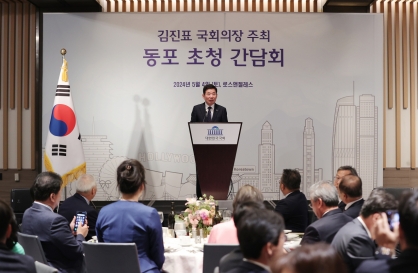A fundamental human right is equality under the law regardless of race or gender. This right is complemented by the right of individuals to petition the government for redress, a right exercised by accessing the court system. These rights are a large part of what distinguishes open democratic nations from oppressive autocratic dictatorships. Nowhere in the world should this dichotomy be clearer than on the Korean Peninsula. However, South Korean courts are failing in their duty to provide open access to all individuals. This failure stems from the lack of adequate translation services for foreigners.

As Korea becomes more multinational and multilingual this need grows. Between 2005 and 2009 international marriages averaged between 10 and 14 percent of all marriages and since 2009 over 40 percent of marriages in the southern countryside have been international marriages. Inevitably some of these marriages will end in acrimonious divorce. The Korean government also works tirelessly to attract foreign investment and has established multiple free enterprise zones to further this goal. Yet not all of these businesses will succeed and some will fail ignominiously, dissolving into bitter disputes among the investors. These factors will result in an ever greater number of foreigners with limited or no knowledge of the Korean language petitioning the Korean courts for redress of their grievances.
How Korean courts react to these cases will impact Korea’s future ability to transition to a truly international power. America, Australia and many European countries long ago adopted systems guaranteed to provide competent certified translators to individuals who are not fluent in the language the court uses. This openness provides foreigners with the assurance to move to and invest in those countries. Coincidentally those same countries have led the world in science, technology and industry, arguably because so many talented foreigners choose to live there.
In 2008 the Korean Supreme Court began discussing the need for a competent translation certification service; however, as of 2011 nothing concrete has been done to address the inconsistent abilities among court translators. Currently the law continues to allow anyone, Korean or foreign, who is approved by the judge to act as an interpreter. These judges, who have spent years studying solely law, often have little or no knowledge of any foreign language. Yet these judges are empowered to certify individuals as translators in any number of languages. International marriages include Chinese, Vietnamese, Cambodian, Filipino, Malaysian, Australian, American, Russian and numerous other nationalities. International businessmen hail from Russia, China, America, European countries, Southeastern Asian countries and even Africa. A judge cannot be expected to have sufficient knowledge of all of these languages to be able to ascertain a translator’s ability.
The impact of inadequate translation services can be dramatic. In 2006 two soldiers before the Uijeongbu District Court were asked by the judge in Korean if they “admitted” to the charges; however the translator asked the soldiers if they were “aware” of the charges. The soldiers were obviously aware of the charges and answered yes to the judge’s questions, but their answers likely would have changed if the translation had been accurate. These soldiers had the advantage of having the entire United States military behind them in rectifying the issue. For a foreign spouse from an average family unable to call on the power of his or her respective government, the lack of adequate translation may result in the loss of their children and an unfair division of marital assets. For small foreign entrepreneurs, inadequate translation may mean the loss of years of work and hundreds of thousands or millions of dollars in investment. While the Korean government focuses solely on multinational investments in Korea, studies have definitively shown that job creation is the exclusive province of startups. Enticing a multitude of small investors to Korea will have a greater impact on job creation and growth than the occasional multinational investment. Finally, the involvement of foreign spouses in the raising of young children has immeasurable emotional and psychological benefits for all, while fair treatment before the courts for the unfortunate divorcee will impact how Korea is viewed by future potential spouses in the divorcee’s home country.
Thus Korean courts are, once again, holding back the progress of South Korea and negating the ongoing efforts of the government to attract foreign investors, foreign scholars and long term residents. The judiciary must comprehend the impact that a guarantee of fairness before the courts has on investment, relocation and even marriage decisions of foreigners. As has so clearly been shown by the ongoing Lone Star investment case, all of the efforts of the Korean government to entice foreign investors, scholars and spouses to Korea can be destroyed by one well publicized case of inequitable treatment of a foreigner by the Korean judiciary.
By Daniel Fiedler
Daniel Fiedler is a professor of law at Wonkwang University since 2007 and is the lawyer representative for international marriages in Namwon City since 2009. ― Ed.

As Korea becomes more multinational and multilingual this need grows. Between 2005 and 2009 international marriages averaged between 10 and 14 percent of all marriages and since 2009 over 40 percent of marriages in the southern countryside have been international marriages. Inevitably some of these marriages will end in acrimonious divorce. The Korean government also works tirelessly to attract foreign investment and has established multiple free enterprise zones to further this goal. Yet not all of these businesses will succeed and some will fail ignominiously, dissolving into bitter disputes among the investors. These factors will result in an ever greater number of foreigners with limited or no knowledge of the Korean language petitioning the Korean courts for redress of their grievances.
How Korean courts react to these cases will impact Korea’s future ability to transition to a truly international power. America, Australia and many European countries long ago adopted systems guaranteed to provide competent certified translators to individuals who are not fluent in the language the court uses. This openness provides foreigners with the assurance to move to and invest in those countries. Coincidentally those same countries have led the world in science, technology and industry, arguably because so many talented foreigners choose to live there.
In 2008 the Korean Supreme Court began discussing the need for a competent translation certification service; however, as of 2011 nothing concrete has been done to address the inconsistent abilities among court translators. Currently the law continues to allow anyone, Korean or foreign, who is approved by the judge to act as an interpreter. These judges, who have spent years studying solely law, often have little or no knowledge of any foreign language. Yet these judges are empowered to certify individuals as translators in any number of languages. International marriages include Chinese, Vietnamese, Cambodian, Filipino, Malaysian, Australian, American, Russian and numerous other nationalities. International businessmen hail from Russia, China, America, European countries, Southeastern Asian countries and even Africa. A judge cannot be expected to have sufficient knowledge of all of these languages to be able to ascertain a translator’s ability.
The impact of inadequate translation services can be dramatic. In 2006 two soldiers before the Uijeongbu District Court were asked by the judge in Korean if they “admitted” to the charges; however the translator asked the soldiers if they were “aware” of the charges. The soldiers were obviously aware of the charges and answered yes to the judge’s questions, but their answers likely would have changed if the translation had been accurate. These soldiers had the advantage of having the entire United States military behind them in rectifying the issue. For a foreign spouse from an average family unable to call on the power of his or her respective government, the lack of adequate translation may result in the loss of their children and an unfair division of marital assets. For small foreign entrepreneurs, inadequate translation may mean the loss of years of work and hundreds of thousands or millions of dollars in investment. While the Korean government focuses solely on multinational investments in Korea, studies have definitively shown that job creation is the exclusive province of startups. Enticing a multitude of small investors to Korea will have a greater impact on job creation and growth than the occasional multinational investment. Finally, the involvement of foreign spouses in the raising of young children has immeasurable emotional and psychological benefits for all, while fair treatment before the courts for the unfortunate divorcee will impact how Korea is viewed by future potential spouses in the divorcee’s home country.
Thus Korean courts are, once again, holding back the progress of South Korea and negating the ongoing efforts of the government to attract foreign investors, foreign scholars and long term residents. The judiciary must comprehend the impact that a guarantee of fairness before the courts has on investment, relocation and even marriage decisions of foreigners. As has so clearly been shown by the ongoing Lone Star investment case, all of the efforts of the Korean government to entice foreign investors, scholars and spouses to Korea can be destroyed by one well publicized case of inequitable treatment of a foreigner by the Korean judiciary.
By Daniel Fiedler
Daniel Fiedler is a professor of law at Wonkwang University since 2007 and is the lawyer representative for international marriages in Namwon City since 2009. ― Ed.



![[AtoZ Korean Mind] Does your job define who you are? Should it?](http://res.heraldm.com/phpwas/restmb_idxmake.php?idx=644&simg=/content/image/2024/05/06/20240506050099_0.jpg&u=)














![[K-pop's dilemma] Is Hybe-Ador conflict a case of growing pains?](http://res.heraldm.com/phpwas/restmb_idxmake.php?idx=642&simg=/content/image/2024/05/07/20240507050746_0.jpg&u=)